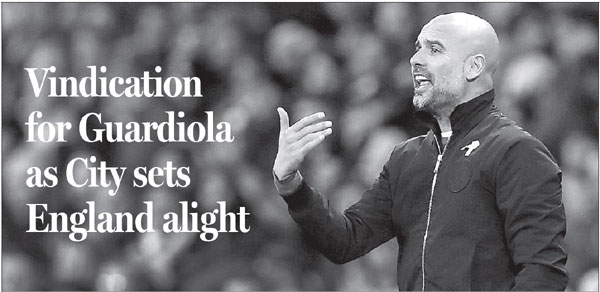Vindication for Guardiola as City sets England alight
Pep proves detractors wrong by showing style needn't be sacrificed
MANCHESTER, England - Manchester City manager Pep Guardiola was basking in a victory that might have wrapped up the Premier League title by early December when he turned on the skeptics who doubted his philosophy could work in English soccer.
"People said in England you cannot play that way," Guardiola said after City's 2-1 win at Manchester United on Sunday. "In England, you can play that way as well."
And who can argue with him? His team is setting standards never before seen in the history of England's top division - and doing it in style, too.
City has won a record 14 straight games, and dropped just two points all season, to establish an 11-point lead after 16 matches. They've scored the most goals (48) and conceded the joint-fewest (11) in the league.
According to Opta, the official statistics supplier to the Premier League, City has an average possession of 71.6 percent in matches, an average pass accuracy of 88.5 percent, and has had more touches in the opposition box (616) than any other team.
Those are the spectacular results of his work. But as important to Guardiola is the process.
Even in the toughest periods of his first season at City, when the team was eliminated in the last 16 of the Champions League and clinched a top-four Premier League finish only on the final day, Guardiola never wavered from his belief in the fundamentals of his philosophy.
Dominating possession; attacking at every opportunity; trying to win every game.
He often paid lip service to English soccer devotees who felt he needed to tweak his tactics to succeed in the Premier League, notably because of the intensity of the schedule, the weather, and the perceived high standard of the top division. Maybe he did so to downplay expectations, too.
"I'm not going to change England and I don't want to do that," Guardiola said in January, when City was toiling amid a period of inconsistent results midway through last season. "Of course, it's going to change me. That's why I came here - to be changed."
In some subtle aspects, perhaps he has changed. He's recognized the importance of winning the second ball, acknowledged that his team will not control every game for 90 minutes, grown to understand the difference with English referees.
But deep down, Guardiola was never going to change. His philosophy, developed at Barcelona under the tutelage of his mentor and one-time coach Johan Cruyff, was too ingrained. Only now does he feel he is being vindicated.
"We are clear, we are open," Guardiola said after the win at Old Trafford. "We want the ball, want to attack, want to try to win the games in the way we believe. The others can do whatever they want. My players want to play, want to attack.
"Sometimes they're quicker, sometimes they're faster, but they're not a team who try to look for something special. Because we are honest. We're going to face the opponent face-to-face, to try to win."
Guardiola has treated matches away to big rivals United and Chelsea in the same way he has any other side. And he doesn't hide it.
City had 65 percent possession against United, which had supposedly regained its so-called fear factor at Old Trafford having not lost there in 40 games in all competitions, and had almost double the number of shots (14 to 8).
In September, City went to Chelsea and beat the defending champion 1-0 with a display that was even more dominant than that against United. In both games, Guardiola played a front three with two attacking wingers, and playmakers David Silva and Kevin De Bruyne in midfield.
There was no obvious sign of tailoring his formation according to the opposition.
"We came here, like we were at Stamford Bridge and all the games since I came here, to try to win," Guardiola said. "And I'm so happy."
Last season, Guardiola maybe placed too much faith in the ability of some City players who weren't good enough or skilled enough to carry out his orders. His fullbacks, for example, weren't technically gifted enough to move into midfield and either contribute to attacks or be an initial block to a counterattack.
Now, after another spending spree last summer, he is close to having his ideal team.
Xavi Hernandez, a playmaker and captain under Guardiola at Barcelona, said upon the coach's arrival in the Premier League in the summer of 2016 that Guardiola "changed world football" and "is one of the few people who can change English football".
The manner of City's relentless march to the Premier League title shows Xavi could be right.
When he was presented as City manager in July 2016, Guardiola - in an attempt not to sound too arrogant - said that "to come to the country which created football and believe you have to change something, would be a little bit presumptuous."
"I'm not good enough to change everything," he said then.
Maybe he is.
Associated Press
|
Pep Guardiola shouts instructions at his Manchester City players during an English Premier League match against West Ham at Etihad Stadium, Manchester on Dec 3.Russell Cheyne / Reuters |
(China Daily 12/13/2017 page23)










